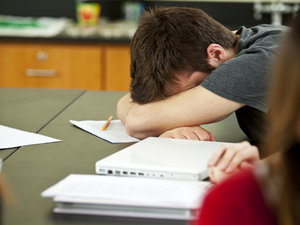Teens Sleeping In Saves Lives?!

Teens are often staying up past midnight only to wake up early to go to school. A new study finds that pattern to not only be dangerous, but it could be deadly. The study by the Center for Disease Control and Prevention found that teens who get fewer than seven hours of sleep on school nights were more likely to engage in risky behaviors. This includes activities such as texting and driving, drinking and driving, riding with a driver who was drinking, and not wearing a seat belt in a car or a helmet while on a bicycle. These teens are more than likely to do such things compared to teens who sleep nine hours a night. The report by the National Center for Chronic Disease Prevention analyzed questionnaires from more than 50,000 high school students in 2009, 2011, or 2013, all which document the latest research of how negative the impact a lack of sleep can be for teens. In 2011, the CDC found that insufficient sleep among teens, less than eight hours on average a night, was associated with cigarette, alcohol and marijuana use, sexual activity, not getting enough exercise, feeling sad or hopeless, and seriously considering suicide. Almost 70% of teens were not getting enough sleep. Schools around the country are moving in the direction of starting later. What began as only 23 states working towards this move has grown to be 44 states. Aaron Abshire (17′) says that he gets 7 hours on average which moderately affects his performance. He believes that his amount of sleep does not really change how he handles school. Getting an average of 5 hours of sleep, Andrew Goodrich (17′) describes a situation where if school started later, that would mean he would have fewer work hours. CCPS could consider such a change after considering all of the advantages versus disadvantages. This would have to include input from the public on how they would feel with such a change. This kind of change would affect several different before and after school factors as they get out at a later time which might hinder students’ current routines. Overall, this study is an insight on the reality of how teens are affected by their sleep patterns.


